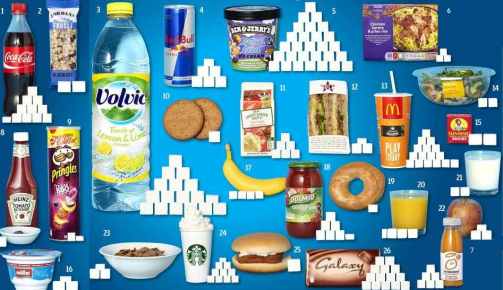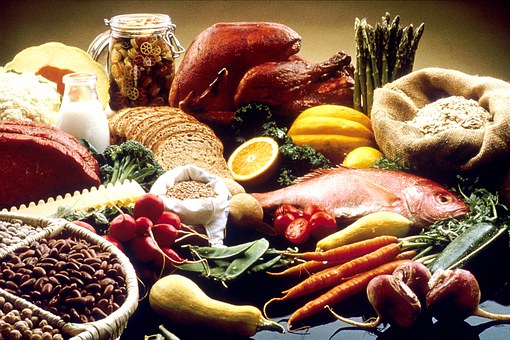
In part four of this series I looked at how critical it is to get the diet right for the 7 – 14 age range for both boys and girls for their overall health and immune systems. I also suggested that millions of children are getting packed lunches, and that a large percentage of those were sugar laden and nutritionally deficient.
This week I am share the the impact on a child’s body of a high sugar diet and lack of nutrition in relation to their brain development and hormone production as they head into puberty.

Whilst the focus so far has been on obesity, there is a much larger and potentially more dangerous consequence to a diet that is nutritionally deficient and high in sugar. It can seriously impact a child’s brain development and consequently healthy hormone production.
There is so much hidden sugar in manufactured food that it is difficult to be specific about the amount a child is consuming every day, but it is estimated that in the USA this is 50lbs of sugar per year.
And as this information about children in the UK identifies, a year’s worth of sugar is being consumed in six months Gov. UK
Sugary soft drinks remain one of the main contributors of free sugars to children’s diets, more than ice cream and puddings combined.
Apart from fruit juice, which counts as one of our 5 A Day, the other main sources of sugar in children’s diets are:
Sugary soft drinks (including squashes, juice drinks, energy drinks, cola and other fizzy drinks) 10%
Buns, cakes, pastries and fruit pies 10%
Sugars, including table sugar, preserves and sweet spreads 9%
Biscuits 9%
Breakfast cereals 8%
Chocolate confectionery 7%
Sugar confectionery 7%
Yoghurt, fromage frais and other dairy desserts 6%
Ice cream 5%
Puddings 4%
The additional problem is that if you can read the small print on the labels, most sugars are given an alternative name to fool the consumer…with the outcome of also damaging the health of their children. One of the most damaging being Corn Syrup which is used in most manufactured sweet products.

There is growing evidence that not only is all this sugar fueling the obesity and diabetes epidemics but it is compromising our children’s brains and mental and physical development.
A high sugar diet leads to a decrease in attention span and memory retention.
When a child has consumed a lot of sugar and then attempts a complex problem in say mathematics, the hypothalamus in the brain encourages the release of the stress hormone cortisol. When this response is frequent, which could be daily with a child on a high sugar diet, it makes a child agitated, and less likely to pay attention. They also find it difficult to retain information.
Long term sugar consumption might permanently result in the impairment of memory functions.
We are only now seeing the results of long term sugar consumption at these exceptional levels, and scientists have raised concerns that this will have a permanent impact on a child’s brain into adulthood.
A high sugar diet can cause malnutrition in children
A high sugar diet leads to a change in a child’s appetite, and usually turns them into a picky eater, as their brains react to excess of sugar by signalling to the body that it is full. They are also resistant to eating foods that are savoury rather than sweet. This leads to the exclusion of brain health specific foods such as vegetables, whole grains, dairy and healthy fats. This in turn leads to deficiencies of nutrients essential in this period of rapid growth physically and mentally.
Deficiency on the increase lack of sunshine, industrially produced foods, Keto diet
Disruption to a healthy puberty when the brain function has been compromised by sugar.
The brain health of all ages is dependent on the production of hormones in the body, and it is critical that the age group 7-14 for boys and girls offers a diet rich in certain nutrients, to ensure that they go through a healthy puberty and young adulthood.
The brain is still developing and requires a daily diet that provides specific nutrients to accomplish this healthily. Later in the post I have included those nutrients and their main food sources.
These are just the glands in the brain that produce hormones but you can read about all the hormone glands in the body in The endocrine system and hormones
The Hypothalamus
The other name of the hypothalamus is actually the word homeostasis, which means balance, which is very appropriate. It is located in the middle of the base of the brain and is connected to the pituitary lobes, which form the most important gland in the body and is often referred to as the Master Gland.
The hypothalamus regulates body temperature, blood sugar, water balance, fat metabolism, appetite, body weight, sensory input like taste and smell and sight, sleep, sexual behaviour, emotions, hormone productions, menstrual cycle regulation and the automatic nervous system that controls automatic functions such as breathing and the heart muscle.
The Pituitary gland
The pituitary gland has an anterior and posterior lobe. The anterior lobe regulates the activity of the thyroid, adrenals and the reproductive glands producing a number of hormones.
- Growth hormone stimulates the growth of bone and body tissues and plays a part in the metabolism of nutrients and minerals.
- Prolactin, which activates milk production in mothers who are breast-feeding.
- Thyrotropin which stimulates the thyroid to produce hormones.
- Corticotrophin which stimulates the adrenal glands to produce its hormones.
- Gonadotrophs are cells that secret the two hormones that stimulate hormone production in the ovaries and testes. These are called luteinising hormone (LH) and follicle stimulating hormone (FSH) and whilst not essential to life are essential to reproduction.
- It is also the gland that releases hormones that signal the ovaries and testes to make the sex hormones and controls the ovulation and menstrual cycle.
The Pineal gland
This gland is located in the middle of the brain and secretes melatonin, the hormone that regulates sleep cycles. Being tired all the time will certainly not help maintain a healthy hormone balance.
If a child is consuming too much sugar, and is obese then this hormone production process will be compromised.

Weaning a child (and an adult off sugar)
Weaning a child of sugar is difficult, especially if they have been consuming it in their food from birth in formula, manufactured baby foods, and onto high sugar adult foods. Sugar cravings are dreadful and I speak from experience and I was an adult. Don’t suddenly deprive the body and brain from this addictive stuff and plan on a gradual removal.
- Start with your own diet. Do you consume too much sugar and it that seen as normal to your children? How much sugar is hidden in your staples in your larder such as cereal, tinned goods and jars of jam and sauces?
- Cut back slowly, change any fizzy drinks to diluted fruit juice and you can sparkling mineral water to give it some fizz. Introduce fresh fruit rather than a sugary snack bar, including an apple, banana, or orange.
- Change from sugary cereals to a healthy fat breakfast such as an egg on whole grain toast, omelette, use real butter and coconut oil if you are going to fry an egg or to make french toast. Avocado toast also makes a good start to the day.
- Check with the school if your child is having cooked lunches and make sure they are working to the new standards of increased vegetables, wholegrains, salads etc. If you are preparing a packed lunch then include fresh fruit, wholegrain sandwich with chicken or tinned tuna with salad, some unsalted nuts and if not had an egg for breakfast, add a hard boiled one to the lunch box.
- Start reducing biscuits (cookies) to just one with a glass of milk rather than a soda. Two average cookies a day add up to 300 calories which in a year amounts to 31lbs in body fat. Two average cookies will also contain 10grams of sugar. It is recommended that children should not consume more that 25grams of added sugar.
- Make sure as a family you eat your main meal or supper together each day and lead by example when it comes to introducing new foods to encourage a varied diet. To save time bulk cook and freeze portions.
- Cook from scratch instead of using industrially produced sauces.. again you can make a great tomato, basil and garlic sauce and freeze portions to use.
- Use non-sugary toppings for toast such as Marmite, fresh chicken, tinned tuna etc.
Essential fatty acids
One of the most important food source for brain and healthy hormones are essential fatty acids which are Omega-6 and Omega-3 fatty acids (polyunsaturated fatty acids). The body must have these essential fatty acids, yet cannot make them itself. One of the main functions of essential fatty acids is the production of prostaglandins which are the hormone-like substances that regulate many body functions. They basically control every cell of the body on a second-by-second basis by acting as interpreters between the hormones and the cells they are being delivered too. They are also concerned with energy production, increasing oxidation and metabolic rates. They are particularly important to balance all hormones including the reproductive ones and the brain does not function without them.
Monounsaturated fats are also important as both these types of fats protect brain cells and the membranes and ensure effective passing of nutrients within the brain.
Make sure children are hydrated to safeguard their brains with water, milk and diluted fruit juices but not with fizzy sodas with added sugars

As well as the usual unprocessed and natural diet it is important to include the following foods which are the best sources for the nutrients needed for healthy brain and hormone production
Essential Fatty acids
Omega 3. Flaxseed oil, walnuts, pumpkinseeds, Brazil nuts, sesame seeds, avocados, dark green vegetables such as spinach, salmon, mackerel, sardines, anchovies, tuna.
Omega 6. Flaxseed oil, pumpkin seeds, pine nuts, pistachios, sunflower seeds, olive oil, evening primrose oil, chicken.
Omega 9. Olive oil, olives, avocado, almonds, sesame oil, pecans, pistachio, cashews.
Heat and oxygen destroys essential fatty acids so keep your oils in dark glass and your nuts in sealed containers.
Antioxidants are found in all fresh fruit and vegetables and if you are eating 50% to 60%of your diet raw you will be doing great.
B vitamins are found in apricots, avocado, brown rice, carrots, chicken, eggs, whole grains, lambs kidney and liver, melon, nuts, oats, oily fish, potatoes, pumpkin, carrots, spinach, all salad vegetables and yoghurt.
Amino acids are found in proteins either animal or vegetable. Main sources are Soya beans, peas, beans, whole grains like brown rice, dairy products, poultry, lean meats and eggs.
Calcium is found in yoghurt (natural with added berries or nuts), sesame seeds, goats and cows milk, spinach and other dark green leafy vegetables and cheese.
Magnesium is in pumpkinseeds, spinach, salmon, sunflower seeds and beans.
Zinc is in calf liver, beef, lamb, yoghurt, mushrooms, pumpkinseeds and sesame seeds.
Tryptophan is in chicken, turkey, tuna, beef, lamb, halibut and salmon.

The next stage in the bodies development is 14 to early 20s which marks the end of the growth period and adulthood. Unfortunately this is also the age that is more difficult to manage from an eating perspective, especially after eighteen and a child either moves into further education away from home or becomes more independent.
However, if up to that point they have avoided a sugar laden diet, had moderate exercise and enjoyed a mainly ‘cook from scratch’ diet, they are more inclined to continue with at least elements of that when they fend for themselves.
Which is why I am an advocate for cookery classes at school as well as in the home to provide them with a vital life skill. That of providing their bodies with the healthiest diet possible, and hopefully skills they will pass on in turn.
It may take a generation but it is possible to reverse this trend towards a catastrophic obesity crisis.
©Sally Cronin Just Food for Health 1998 – 2024

I am a qualified nutritional therapist with twenty-five years experience working with clients in Ireland and the UK as well as being a health consultant on radio in Spain. Although I write a lot of fiction, I actually wrote my first two books on health, the first one, Size Matters, a weight loss programme 20 years ago, based on my own weight loss of 154lbs. My first clinic was in Ireland, the Cronin Diet Advisory Centre and my second book, Just Food for Health was written as my client’s workbook. Since then I have written a men’s health manual, and anti-aging programme, articles for magazines, radio programmes and posts here on Smorgasbord.
If you would like to browse my health books and fiction you can find them here Sally’s books and reviews 2024
You can buy my books from: Amazon US – and:Amazon UK – Follow me :Goodreads – Twitter: @sgc58 – Facebook: Sally Cronin – LinkedIn: Sally Cronin
As always I look forward to your comments and if you have any questions don’t hesitate to ask them.. thanks Sally.

Thanks, Sally, for spreading the information. Sugar used to be a luxury, and was not used as liberally as it is now. Not all changes are for the better, and that is definitely the case for many dietary modifications.
LikeLiked by 1 person
You certainly did not see much around after the war and when we were children as it was still rationed for some considerable time. Our pocket money bought a small bag of sweets once a week. ♥
LikeLike
Pingback: Smorgasbord Blog Magazine – Weekly Round up July 25th – 31st July 2022 – Hits 2000, Nina Simone, Waterford, History, Podcast, Book Reviews, Summer Bookfair, Health and Humour | Smorgasbord Blog Magazine
Hi Sally, it is shocking how much sugar is in these sweet fizzy drinks. I’ve never let my sons have them.
LikeLiked by 1 person
Terrifying and I shudder when I see kids drinking out of those 32oz cups on tv.. ♥
LikeLiked by 1 person
I am grateful my son drinks water willingly. I’ve never allowed sodas in my house. He does drink organic lemonade, but we even water that down with water so he has a bit of the flavor but not the full glass of sugar. I drink water and tea. I’ll treat myself to a Starbucks tea once a week (moderation, right? 😉). As for foods, it’s mostly meats, fruits and veggies for both of us. He has a few processed snacks, but it’s just a small part of his diet. This was a great post, Sally! 😊
LikeLiked by 1 person
Sounds great Yvette and your son has had a great start in life for his health in body and mind… a great example to others.. hugsx
LikeLiked by 1 person
Sugar…it comes at us from all directions we are surrounded by it…An excellent but sobering article Sally…reblogged for tomorrow…Hugs
LikeLiked by 1 person
Thanks very much Carol. We are surrounded by it and it is the manufacturers magic ingredient… a captive audience.. hugsx
LikeLiked by 1 person
Indeed, Sally and as with all our foods (as) Dorothy pointed out the figures quote portion sizes not the overall size of the bottle or packet…a huge difference… Hugs xx
LikeLiked by 1 person
An amazing article, Sally – incredible the effect of sugar, and so much of the sugar in the diet is hidden. Toni x
LikeLiked by 1 person
Thanks Toni.. it is and most of that is deliberate. Manufacturers know that many of their consumers are sugar aware now but far more are not bothered.. Small print and fancy marketing is their stock in trade.. ♥
LikeLiked by 1 person
A comprehensive article of important facts Sal, from the harm that sugars can do, to all the different parts of the brain reacting. And something I thought was so interesting, those eating so much sugar may in fact turn away from healthful savory foods because they are conditioned by sugar overload. Amazing info here Sal. ❤ xxx
LikeLiked by 1 person
Thanks Debby it is allegedly one of the most addictive substances. I went cold turkey back at the start of my weight loss and I felt I had gone 10 rounds with Ali in the ring. Physically, mentally and emotionally reliant on the stuff.. ♥♥
LikeLiked by 1 person
Absolutely Sal – just like nicotine! ❤ xx
LikeLiked by 1 person
Excellent information here, Sally. Incredible the effect sugar has on the body, and even more incredible when you realize the effects can be worse in children’s bodies. Thanks for this terrific series.
LikeLiked by 1 person
Thanks very much Amy.. hugsx
LikeLiked by 1 person
I cringe to think about how much sugar I used to eat as a child. I trt to steer the grandkids in a heathier direction but sugar seems to be just as popular as it was when I grew up. Great post, Sally 🙂
LikeLiked by 1 person
We seem to have an inbuilt sweet tooth Denise.. and it would be a shame to have to live without it completely. hugsxx
LikeLike
Very interesting reading.
LikeLiked by 1 person
Thanks Sue..hugsx
LikeLiked by 1 person
a healthy diet without exercise is like a boat without a paddle.
LikeLiked by 1 person
Very true Wayne.. aptly put.. x
LikeLiked by 1 person
Wow, i really never had thought sugar could be so harmful, also for the brain. Better drink alcohol. Lol Sorry, Sally! Thanks for the important reminder. As i have neither kids, nor i am married, i would have to eat all the sweeties by myself. So i don’t take them on storage, for a bettr life. hugsx Michael
LikeLiked by 1 person
Reblogged this on NEW BLOG HERE >> https:/BOOKS.ESLARN-NET.DE.
LikeLike
Another article full of needed facts. Thank you Sally. Looking at the “How much sugar is in your drink” chart, I’m reminded that as high as the numbers sound, they are doubled if the entire bottle is consumed, because the fine print also usually says 2 or 2.5 servings.
LikeLiked by 2 people
Quite Dorothy, and certainly children don’t look at that sort of thing.. and of course when you buy from the fast food chains in their 16oz and 32oz cups you can be getting a great deal more..♥
LikeLiked by 1 person
Oh, that’s true too!
LikeLiked by 1 person
There’s a tendency for people to think of foods in terms of weight gain and the statistics you give regarding the obesity epidemic in the developed world make for sobering reading. This series of yours focuses on the WHOLE system and explains why we do need certain elements for our bodies to function healthily and effectively. This is great, Sally! xx
LikeLiked by 1 person
Thanks very much Alex.. I appreciate that…hugsx
LikeLiked by 1 person
Reblogged this on Pattys World and commented:
If you’re a parent or just interested in leading a more healthy life, you must take a few moments to read this post.
Sally Cronin is quite knowledgeable on this topic and has much wisdom and factual information to share.
Sally also contributes to the “Health World” column in the Writer’s Grapevine Mag.
Thanks and have a grand day.
LikeLiked by 3 people
Thanks very much Patty hugsx
LikeLike